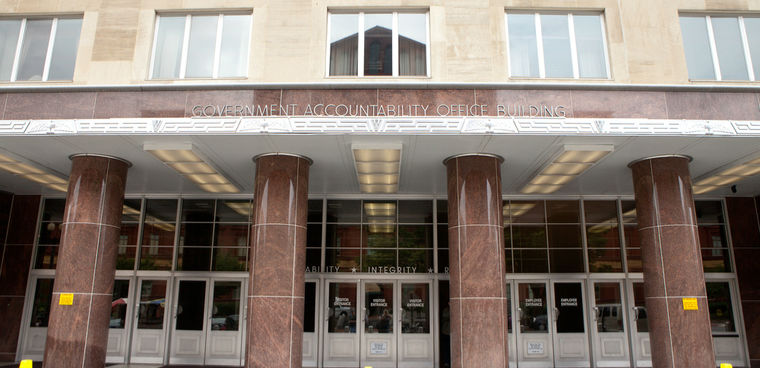GAO expands and elevates tech assessment
In response to a demand from lawmakers, the Government Accountability Office is launching a new team to provide technology expertise to Congress.

GAO Headquarters in Washington D.C. (Photo credit: Mark Van Scyoc/Shutterstock)
The Government Accountability Office is stepping up its efforts to help lawmakers get smart on technology issues.
Chiefly known to the public as an audit and compliance arm of Congress, GAO is launching its first new office in 20 years to try to elevate and expand its role as the in-house expert agency for Congress.
The move comes in response to a demand from lawmakers in the legislative reports on the appropriation bill covering Congress.
"This year there was a clear signal from the House and the Senate," Tim Persons, the GAO's chief scientist and co-managing director of the new office of Science, Technology Assessment and Analytics (STAA), said in an interview with FCW. "There was some variance in the guidance, but not in terms of the intent."
The new office launched Jan. 29 with 70 staffers. Persons said that number will double in the next two or three years. Some early focus areas include distributed ledger technologies including blockchain, artificial intelligence in health care and 5G wireless.
While GAO is known for audit reports, it's less well known for technology assessments. But since 2002 the oversight agency has been directed to pilot a plan to take over some of the work done by the Office of Technology Assessment before that agency was shuttered in 1995.
While many have called for a revival of OTA, Persons said that the new GAO office can perform essentially the same work. The GAO website offers past technology assessments, with reports covering computer technology, life sciences, manufacturing, engineering, climate change and water and power infrastructure.
"I think the short answer is: It's not new to us. We've been doing that OTA mission since 2002," Persons said. The successful expansion of GAO's science and technology capacity, he added, is a "legacy issue" for GAO's head, Comptroller General Gene Dodaro.
At launch, GAO combined existing in-house technology staffers and experts for STAA. But Persons said GAO will make outside hires, taking advantage of direct hire authority for technical positions and the Intergovernmental Personnel Authority, which allows government agencies to offer term appointments to academics and researchers at universities and nonprofits.
Tech assessment work at GAO will follow the usual protocols, with a congressional committee or group of members requesting a report in a certain topic area. Persons said that GAO is looking to adopt a "more foresight-oriented posture," under which the STAA will be prepared for questions on upcoming hearings or oversight activities from members and committees. Persons said this activity could include suggesting questions and areas in inquiry at individual hearings or developing a range of policy options for Congress on certain issues, as OTA used to do.
In addition to tech assessments, STAA will review government science and technology programs, serve as a resource for best practices in engineering, develop a lab to study and pilot advanced analytics and innovate on GAO's existing auditing toolkit.






